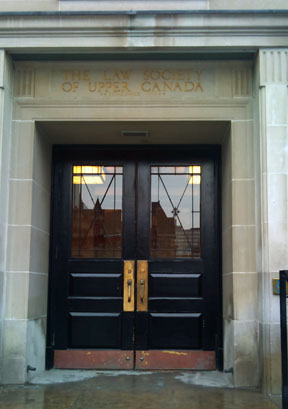The Law Society of Upper Canada’s benchers say more concrete guidance is needed for conducting good character assessment of lawyers and paralegals.

Before joining the Ontario bar, lawyers and paralegals are required to demonstrate they are “of good character.”
The Federation of Law Societies of Canada asked LSUC for its take on changing the way law societies across Canada approach good character inquiries in order to create consistent and well-defined rules across the country. In response, law society benchers said new rules must replace the current “open-ended” ones.
“While some flexibility is important . . . the current open-ended approach to the good character inquiry could lead to subjective analyses that provide little concrete guidance to applicants and adjudicators on the standard to be met,” the law society said in a written response to a
consultation paper.
“It can also lead to [an] inconsistent and potentially non-transparent licensing decision, which is particularly problematic with national mobility.”
The federation suggested changing the name of the inquiry from “good character” to “suitable to practise,” which it said is a more concrete definition for the process. But the law society disagreed, favouring instead to stick with the existing term.
“The change in terminology from ‘good character’ to ‘suitability to practise’ would not improve the process or enlarge the public or profession’s understanding of the requirement,” LSUC said in its response.
“‘Good character’ is a familiar term to many people, particularly as it is applied across many professions, trades, and walks of life,” the law society added. “A criticism of the term is that its vagueness allows for a wide range of interpretations, but the same objection could be applied to the term ‘suitability,’ which has a variety of meanings.”
The existing term should continue to be used as long as it is clear to hearing panels that it does not represent an open-ended inquiry, “but rather focused on the standards of professional conduct required by lawyers and paralegals,” the law society also said.
LSUC did agree, however, that the inquiry should focus on prospective licensees’ honesty, respect for the rule of law, financial accountability, and “governability.”
But for Bencher Mark Sandler, the issue around good character hearings is more about how law societies understand rehabilitation of people who may have, in the past, done something that makes them unfit to practise law. Currently, different panels may arrive at different decisions as to whether someone has been effectively rehabilitated, he said.
Sandler suggested looking into how other professions deal with this issue, such as the possibility of fixing a time period for rehabilitation after a potential licensee has shown behaviour that is against the values of the law society and public interest.
Bencher Malcolm Mercer agreed the issue is something “for us and the federation to consider” as some hearing panels’ decisions on good character and rehabilitation may surprise the public.

 Before joining the Ontario bar, lawyers and paralegals are required to demonstrate they are “of good character.”
Before joining the Ontario bar, lawyers and paralegals are required to demonstrate they are “of good character.”